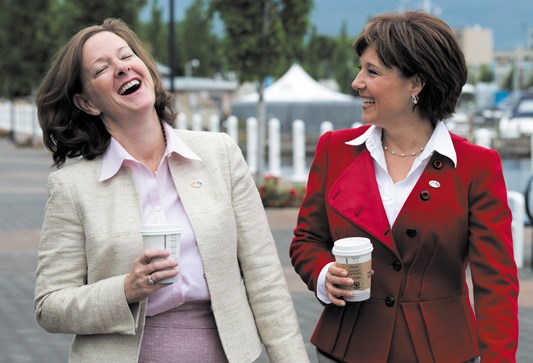B.C. and Alberta may have provided polar opposite recommendations to the federal panel examining the Northern Gateway pipeline, but Christy Clark and Alison Redford are confident the two provinces can sort out their differences.
B.C. Premier Clark and her Alberta counterpart Redford met in Kelowna on Friday to discuss topics of interest for both provinces. Although the provincial leaders said the controversial pipeline proposal to connect northern Alberta with Kitimat didn't come up in their meeting, Northern Gateway still dominated the discussion during the ensuing news conference.
In its final argument to the National Energy Board last month, B.C. said the project as proposed is unacceptable, while Alberta countered in its submission that the pipeline is crucial to the Canadian economy.
Clark stood by her province's statements, but did leave the door open that the B.C. government's position could change over time if the project is modified or more information is provided.
"We are not opposed to economic development and we are not opposed to resource development - for heaven's sake, I was elected on a mandate for both in this recent election - but we just didn't see the fact base that would support us being able to support the Enbridge proposal as it is today," she said. "Between May 31 and the [Joint Review Panel] decision, there's a few more months so we'll see what happens with that."
Redford said she didn't raise B.C.'s objection to the pipeline during Friday's meeting because of the ongoing National Energy Board review process.
"Premier Clark has very clearly set out how British Columbia participated in that process and we respect that," she said. "That's what exactly should happen during a regulatory process."
Clark's government has five conditions that must be met before it will consider approving Northern Gateway and the one that has rankled Alberta in the past is the demand B.C. get its fair share of the economic benefits since B.C. is shouldering a greater environmental risk.
Redford has been clear that Alberta has no intention of sharing its royalty revenues with B.C., but that doesn't preclude an alternate arrangement being found.
Although it wasn't on the agenda on Friday, Clark said she will discuss the economic benefits issue with Redford in due course.
"The way you get there is to start talking and to make sure you're having a friendly, respectful conversation, which is what we had today," she said. "This dialogue is underway and we'll see where it leads us. You don't bridge the divide, you don't find the way to resolve differences that you have, unless you talk."
The pair have had a frosty relationship in the past, but were all smiles in front of the camera on Friday.
"We need to find the areas of agreement where we can work together and not allow the areas where we disagree to divide us," Clark said. "I think we can find solutions on the areas where we disagree, and until we do we should work together because Canada needs us to do that."
Among the practical steps the leaders agreed on was to create a ministerial working group focused on common areas of interest including skills training, immigration and labour. Clark said that will allow the two provinces to "present a united front to decision makers across this country."



